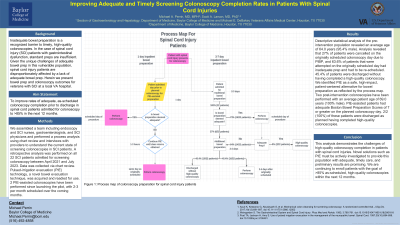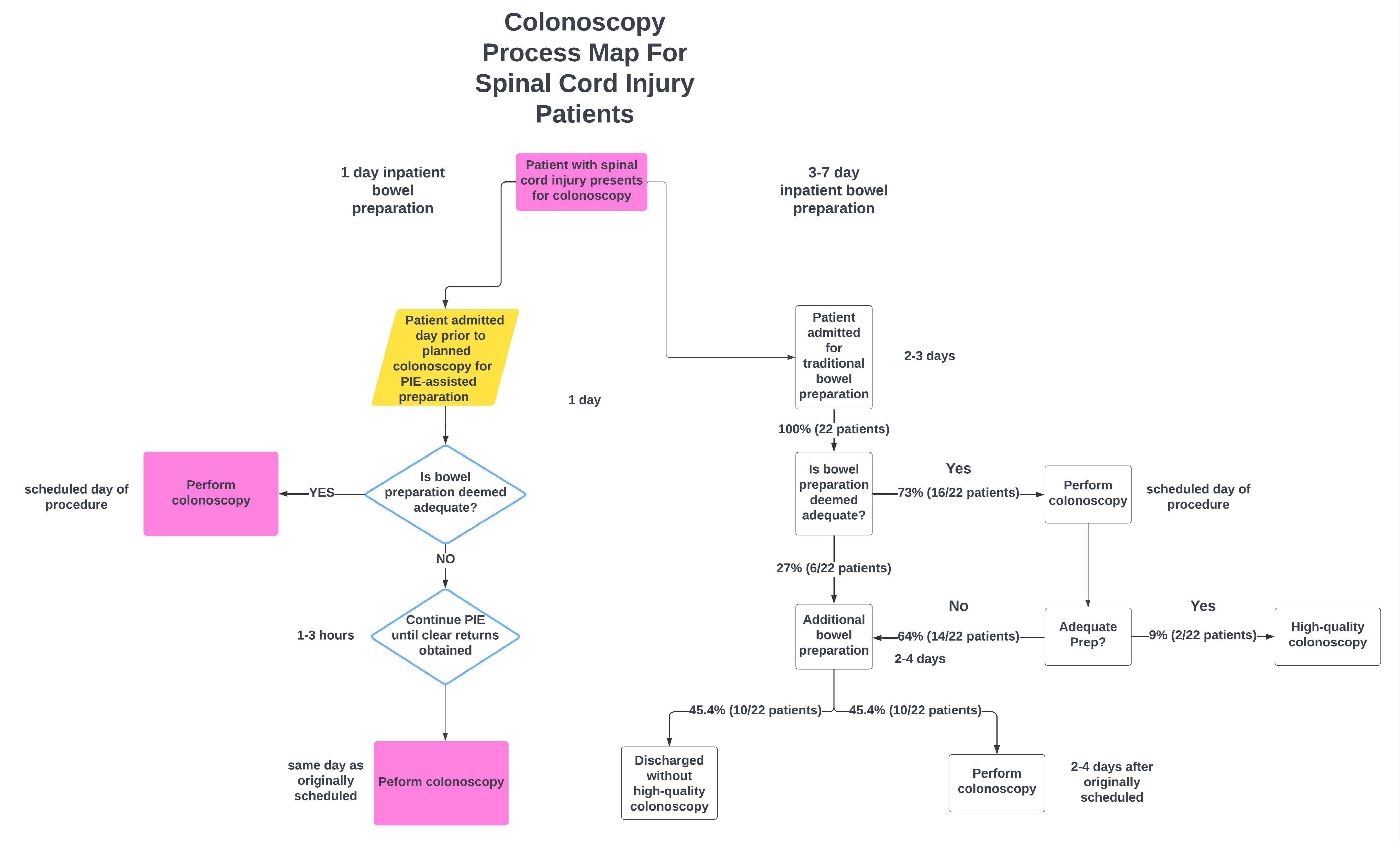Tuesday Poster Session
Category: Colorectal Cancer Prevention
P3852 - Improving Adequate and Timely Screening Colonoscopy Completion Rates in Patients With Spinal Cord Injuries
Tuesday, October 29, 2024
10:30 AM - 4:00 PM ET
Location: Exhibit Hall E

Has Audio
- MP
Michael A. Perrin, MD, MPH
Baylor College of Medicine
Houston, TX
Presenting Author(s)
Michael A. Perrin, MD, MPH, Scott A. Larson, MD, PhD
Baylor College of Medicine, Houston, TX
Introduction: Inadequate bowel preparation is a recognized barrier to timely, high-quality colonoscopies. In the case of spinal cord injury (SCI) patients with gastrointestinal dysfunction, standard preps are insufficient. SCI patients traditionally undergo 2 to 3 days of extended inpatient colonoscopy prep that includes 12L of GoLytely, multiple enemas, and optional Foley catheters and/or rectal tubes. Herein we present a bowel prep quality initiative for veterans with SCI at a local VA hospital.
Methods: We assembled a team including endoscopy and SCI nurses, gastroenterologists, and SCI physicians and performed a process analysis using chart review and interviews with providers to understand the current state of screening colonoscopies in SCI patients. A retrospective analysis was performed on all 22 SCI patients admitted for screening colonoscopy between April 2021 and July 2023. Data was collected via chart review. Pulsed-irrigation evacuation (PIE) technology, a novel bowel evacuation technique, was acquired and readied for use. 2 PIE-assisted colonoscopies have been performed since launching the pilot, with 2-3 per month scheduled over the coming months.
Results: Descriptive statistical analysis of the pre-intervention population revealed an average age of 64.0 years (95.4% male). Analysis revealed that 27% of patients were cancelled on the originally scheduled colonoscopy day due to PIBP, and 63.6% of patients that were attempted on the originally scheduled day had inadequate prep and had to be re-scheduled. 45.4% of patients were discharged without having completed a high-quality colonoscopy. We identified PIE as a safe, high-impact, patient-centered alternative for bowel preparation as reflected by the process map. Two post-intervention colonoscopies have been performed with an average patient age of 69.0 years (100% male). PIE-assisted patients had adequate Boston Bowel Preparation Scores of 7 or greater on the planned colonoscopy day. 2/2 (100%) of these patients were discharged as planned having completed high-quality colonoscopies.
Discussion: This analysis demonstrates the challenges of high-quality colonoscopy completion in patients with spinal cord injuries. Novel solutions such as PIE must be actively investigated to provide this population with adequate, timely care, and preliminary results are promising. We are continuing to enroll patients with goal of >85% as-scheduled, high-quality colonoscopies within the next 12 months.

Disclosures:
Michael A. Perrin, MD, MPH, Scott A. Larson, MD, PhD. P3852 - Improving Adequate and Timely Screening Colonoscopy Completion Rates in Patients With Spinal Cord Injuries, ACG 2024 Annual Scientific Meeting Abstracts. Philadelphia, PA: American College of Gastroenterology.
Baylor College of Medicine, Houston, TX
Introduction: Inadequate bowel preparation is a recognized barrier to timely, high-quality colonoscopies. In the case of spinal cord injury (SCI) patients with gastrointestinal dysfunction, standard preps are insufficient. SCI patients traditionally undergo 2 to 3 days of extended inpatient colonoscopy prep that includes 12L of GoLytely, multiple enemas, and optional Foley catheters and/or rectal tubes. Herein we present a bowel prep quality initiative for veterans with SCI at a local VA hospital.
Methods: We assembled a team including endoscopy and SCI nurses, gastroenterologists, and SCI physicians and performed a process analysis using chart review and interviews with providers to understand the current state of screening colonoscopies in SCI patients. A retrospective analysis was performed on all 22 SCI patients admitted for screening colonoscopy between April 2021 and July 2023. Data was collected via chart review. Pulsed-irrigation evacuation (PIE) technology, a novel bowel evacuation technique, was acquired and readied for use. 2 PIE-assisted colonoscopies have been performed since launching the pilot, with 2-3 per month scheduled over the coming months.
Results: Descriptive statistical analysis of the pre-intervention population revealed an average age of 64.0 years (95.4% male). Analysis revealed that 27% of patients were cancelled on the originally scheduled colonoscopy day due to PIBP, and 63.6% of patients that were attempted on the originally scheduled day had inadequate prep and had to be re-scheduled. 45.4% of patients were discharged without having completed a high-quality colonoscopy. We identified PIE as a safe, high-impact, patient-centered alternative for bowel preparation as reflected by the process map. Two post-intervention colonoscopies have been performed with an average patient age of 69.0 years (100% male). PIE-assisted patients had adequate Boston Bowel Preparation Scores of 7 or greater on the planned colonoscopy day. 2/2 (100%) of these patients were discharged as planned having completed high-quality colonoscopies.
Discussion: This analysis demonstrates the challenges of high-quality colonoscopy completion in patients with spinal cord injuries. Novel solutions such as PIE must be actively investigated to provide this population with adequate, timely care, and preliminary results are promising. We are continuing to enroll patients with goal of >85% as-scheduled, high-quality colonoscopies within the next 12 months.

Figure: Colonoscopy Process Map for Spinal Cord Injury Patients
Disclosures:
Michael Perrin indicated no relevant financial relationships.
Scott Larson indicated no relevant financial relationships.
Michael A. Perrin, MD, MPH, Scott A. Larson, MD, PhD. P3852 - Improving Adequate and Timely Screening Colonoscopy Completion Rates in Patients With Spinal Cord Injuries, ACG 2024 Annual Scientific Meeting Abstracts. Philadelphia, PA: American College of Gastroenterology.
